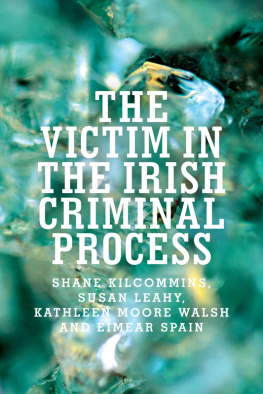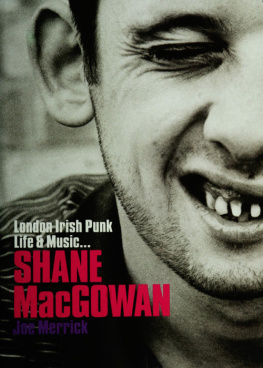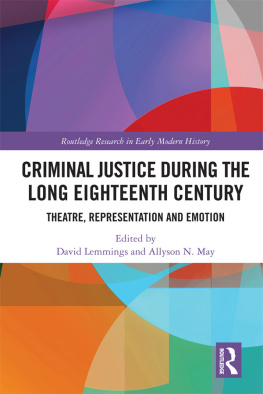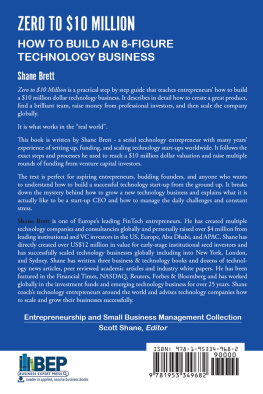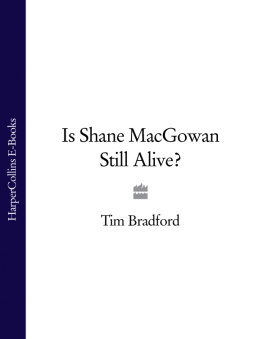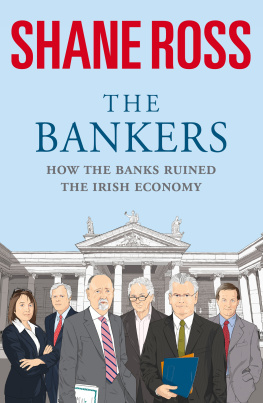Copyright Shane Kilcommins, Susan Leahy, Kathleen Moore Walsh and Eimear Spain 2018
The right of Shane Kilcommins, Susan Leahy, Kathleen Moore Walsh and Eimear Spain to be identified as the authors of this work has been asserted by them in accordance with the Copyright, Designs and Patents Act 1988.
Published by Manchester University Press
Altrincham Street, Manchester M1 7JA
www.manchesteruniversitypress.co.uk
British Library Cataloguing-in-Publication Data
A catalogue record for this book is available from the British Library
ISBN978 1 5261 0638 4paperback
First published 2018
The publisher has no responsibility for the persistence or accuracy of URLs for any external or third-party internet websites referred to in this book, and does not guarantee that any content on such websites is, or will remain, accurate or appropriate.
Typeset
by Toppan Best-set Premedia Limited
In 2003 a European Commission report commented that: One of the greatest tests of the quality of a justice system is how well it treats its victims. Appropriate treatment is a demonstration of societies solidarity with each individual victim and a recognition that such treatment is essential to the moral integrity of society. This book adds a rich tapestry of historical information, analysis and support information for all involved with the criminal justice system in Ireland, for victims, for Garda, for the prosecution, for the defence and for the judiciary. The timing of this book is very important and informative as we move to transpose the European Union (EU) Directive on Victims Rights into our legislation with the Criminal Justice (Victims of Crime) Bill 2015 making its way through the houses of the Oireachtas.
Victims of crime enter the criminal justice system by chance rather than by choice. Few would deny the often devastating effects that crime has on those upon whom it is inflicted. Victims of crime may be affected in many ways: physically, emotionally, psychologically and financially. Indeed, their participation and co-operation in the criminal justice system is essential to the prosecution of the guilty and in law enforcement's efforts to control crime in our society. This book gives us a unique insight into every aspect of the victim in the Irish context.
One of the many aspects of this book is the very important historical context it presents. It tracks the participation of the victim in the criminal justice system from the eighteenth century, when victims were the principal investigators of crime and the key decision-makers in the prosecution process, through to the culmination of the displacement of the victim, whose role in the twentieth century became confined largely to the bit-part role of reporting crime and to being only a witness for the State as prosecutor. Not only is this historical expos very informative and interesting but, in highlighting the process that developed over time from victim as main actor to bit-part role, we learn how important it is to ensure that a fair balance of rights is struck between the accused and the victim as we move to implement the EU Directive on Victims Rights into our statute books.
For twenty-four years I worked as a psychotherapist in private practice. Many of my clients were victims of sexual abuse. Some were victims of childhood sexual abuse and others were victims of rape, mainly within intimate partner relationships. However in all that time not one of my clients reported the crimes committed against them to the Garda. One has to ask the question why this was the case. As a consequence of the non-reporting it is not surprising that, as research confirms, so many of these crimes are committed with impunity.
My initial training was in the early 1980s in London, where I trained as an individual psychotherapist and subsequently I trained in Ireland as a Family Therapist in the Mater Hospital and as a Group Analyst in St Vincent's Hospital. At that time the consulting room was seen to be as sacred and confidential as the confessional. There was no question of breaking that confidence. Now, on looking back one could interpret this stance as supporting all the secrecy that surrounded sexual violence and, in a way, as some kind of unconscious collusion with the status quo. But it also reflected that peripheral place that the victim came to occupy in the criminal justice system. There was never any question of my clients reporting to the Garda or going to court. Their expectation was that they would not be believed and they would not get justice and would possibly suffer further victimisation by the system.
From 2006 to 2016 I was the chief executive officer of the Dublin Rape Crisis Centre (DRCC). The Ferns Report had recently been published. The Centre had, in collaboration with the Royal College of Surgeons, published the SAVI (Sexual Abuse and Violence in Ireland; McGee et al.) Report in 2002. While at the time it got very little recognition, over the years it became acknowledged as the most comprehensive research on attitudes to and beliefs about sexual violence in Ireland and was the impetus for the subsequent Ryan, Murphy and Cloyne Reports. We set about lobbying Government, armed with the information from the research, to have the recommendations of SAVI implemented. As a consequence, two new SATUs (Sexual Assault Treatment Units) were set up in Mullingar and Galway, which brought the number of SATUs in the country to six. We delivered eight national annual awareness-raising campaigns supported by COSC (the National Office for the Prevention of Domestic, Sexual and Gender Based Violence, and we presented annual statistics. And yet, as is highlighted in all chapters in this book, we still have a long way to go to ensure that the needs of victims are met.
The stories from victims attending the DRCC included descriptions of their experiences of re-victimisation by the criminal justice system, from reporting to the Garda through to their court experiences. Not every victim's experience was a totally bad one; however, all the victims who spoke to us said that they felt that they were incidental to the criminal justice process. Many who had gone through the system and got a conviction would say that if they had the time over again they would not proceed with their case. As is further demonstrated in this book, victims decided not to proceed with their cases because of a variety of reasons, from an initial bad experience of reporting the crime through to inordinate delays and a lack of communication with the various agents of the criminal justice system. Research supported by the European Daphne Project Different Systems, Similar Outcomes? Tracking Attrition in Reported Rape Cases in Eleven Countries; Corr, M.; OMahony, P.; Lovett, L. and Kelly, L. (April 2009), highlighted Ireland as having the highest attrition rate in comparison to eleven other EU countries in cases of sexual crimes.
The Victim in the Irish Criminal Process brings together every aspect of the victim in the criminal justice system in the Irish context in a way that has not been done before. It will serve as a great source of information and validation of victims experiences, not only for academics but also for those who work on a daily basis with victims of crime and who are in a position to lobby government for the many changes that are still so necessary to redress the balance of the victim and the accused in our criminal justice system. One of the additional assets of this book is that it is possible to read each chapter as a stand-alone in its own right. From the Introduction through the five chapters we learn how the criminal justice system is influenced and how changes come about as society develops and changes. However, change is a process and very often it can be too slow, which can affect the delivery of justice. The old adage justice delayed is justice denied comes through as truth in many of the chapters of this book. For victims, this is not good enough!

